Supporting Greater Success through Continuous Investment
-
Nonstop Connection to Every Continent, 365 Days a Year
Connecting the world through Incheon Airport’s Air Network.
Incheon International Airport’s air cargo network currently (as of December 2022) connects 43 countries and 107 cities through 25 airlines. Including belly cargo on passenger flights, the network expands to 53 countries and 152 cities through 87 airlines. Incheon Airport continues to expand its network, ensuring nonstop connectivity to any city worldwide 365 days a year.
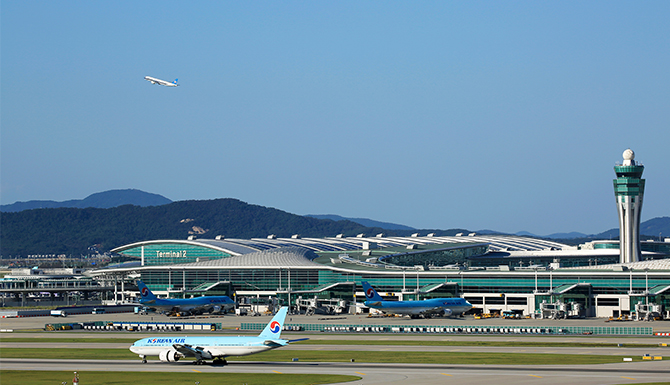
-
Sufficient Cargo Capacity to Handle 6.3 Million Tons Annually
Advancing as a Mega Hub Airport
As of 2022, Incheon International Airport is equipped with logistics infrastructure capable of handling 5 million tons of air cargo annually. Upon completion of the fourth phase of construction, the capacity is expected to increase to 6.3 million tons annually. Incheon Airport plans to develop new cargo terminals and express carrier terminals further in stages to handle the increasing export-import, express, and perishables, advancing as a mega hub airport.
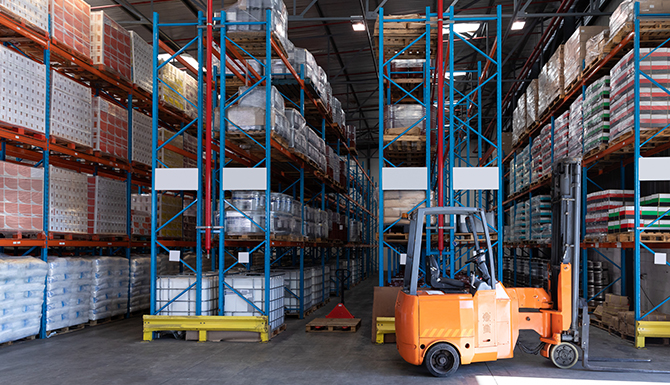
-
Accelerating the Expansion of Cargo Terminals for Global Companies from the U.S., Germany, and Beyond
Expansion of Cargo Terminals at Incheon International Airport
Global logistics company AACT, in addition to its existing Atlas Air Cargo Terminal, has begun operating a new cargo terminal. Leading international express company DHL plans to invest approximately KRW 175 billion to triple the size of its dedicated cargo terminal at Incheon International Airport by 2023. This expansion will increase the handling capacity of the DHL Incheon Hub Terminal by 227%, raising it from 8,100 express parcels per hour to 26,480. Furthermore, through a customer-tailored, build-to-suit development project, the newly expanded FedEx cargo terminal that opened in October 2022 is expected to handle over 170,000 tons of air cargo annually.
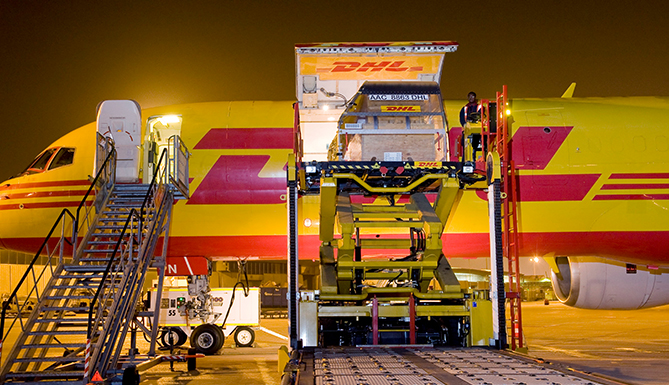
Main Business - Logistics Services - Expansion of Cargo Terminals for Global Companies such as the U.S. and Germany: Cargo Terminal Expansion Companies Scale AACT Commencement of Operations for New Cargo Terminal DHL Approximately KRW 175 billion invested to expand the DHL
Cargo terminal extended by about three times its original size.FedEx The terminal has been expanded by roughly three times through a customer-tailored development project. -
Ensuring Superior Connectivity with Ports
Establishing a Comprehensive Logistics Transport System through Incheon Port
Incheon International Airport is advancing the establishment and expansion of a comprehensive logistics transport system through Incheon Port, aiming to integrate the logistics markets of Korea, China, and Japan into a single network. Located 11 km from the Incheon Airport Logistics Complex, Incheon Port currently hosts 38 shipping companies operating 192 vessels, with 89 weekly calls. The port connects Asia with 31 routes to Japan and China and 32 routes to Southeast Asia including Vietnam and Singapore. Combined with Incheon Airport’s air cargo network, this facilitates more effective sea & air multimodal logistics handling. Moreover, the future implementation of an integrated transport method (RFS, Road Feeder Service) that allows domestic cargo trucks to load directly onto ferries in China and transport to Incheon Airport is expected to reduce customs clearance and transshipment times further; thus making Sea & Air logistics handling more efficient than current methods.
 Building a Complex Logistics Transport System
Building a Complex Logistics Transport System- Incheon International Airport
- Incheon Port
- Integration of Korea, China, and Japan’s Logistics Markets through a Comprehensive Transport System
- Effective Handling of Sea & Air Multimodal Cargo
- Reduction in Customs Clearance and Transshipment Times with the Introduction of an Integrated Transport System
-
Leading Korean Multimodal Logistics Companies Moving into the Logistics Complex
36 Leading Logistics Companies Operating Domestically and Internationally
The first phase of the Airport Logistics Complex (as of December 2022) spans 992,000 square meters with an additional 922,000 square meters in the second-phase expansion. Currently 100% contracted, it is hosting 36 leading domestic and international companies (35 logistics companies + 1 manufacturing company). The tenant business models are diverse, ranging from international cargo transport brokerage, Sea & Air multimodal cargo transport, commercial shippers, cargo consolidators, and global distribution centers (GDC). The focus is on attracting new growth cargo (e-commerce, pharmaceuticals, Perishables) to create sustainable cargo volume and high economic value. Furthermore, Incheon Airport successfully attracted iHerb’s Asian regional international logistics center with state-of-the-art facility spanning a size equivalent to approximately four football fields (33,000 square meters). This development created over 300 jobs and generated economic ripple effects of approximately KRW 100 billion, significantly contributing to national interest. Despite the prolonged COVID-19 pandemic, the cargo volume in the airport logistics complex has increased by an average of 18% annually over the past five years. Incheon Airport attracted the largest air cargo consolidator in Korea and a leading logistics company handling e-commerce cargo from China in 2021, and secured Hyundai Glovis, Korea’s No.1 logistics company, in 2022; thus further driving cargo volume growth.
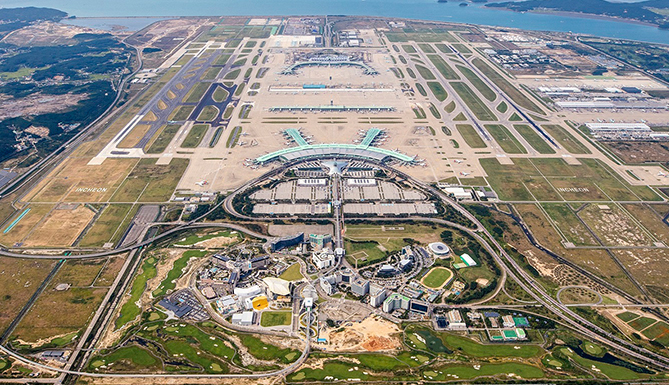 Representative Tenant Business Model
Representative Tenant Business Model- Cargo Consolidation Services
-
Global Delivery
Center -
Sea&Air Multimodal
Cargo Transportation -
International
Freight Forwarding - Commercial Shipper
-
Development of Infrastructure and Investment Environment for the Second Airport Logistics Complex Completed
Designation as a Free Economic Zone and a Free Trade Area
To respond to paradigm shifts in the air cargo market and attract global logistics companies continuously, Incheon International Airport developed the 326,000sq Second Airport Logistics Complex consisting of 20 lots. The Second Airport Logistics Complex is being developed into three zones: a New Growth Cargo Business Zone for creating new growth cargo such as pharmaceuticals and transshipment cargo, a GDC (Global Distribution Center) Business Zone, and a Social Value Business Zone. These zones are designated as part of an Economic Free Zone and a Free Trade Area, offering a business-friendly investment environment with incentives such as tax reductions based on the investment amount. Furthermore, in response to the digital transformation of the logistics industry, investments are being attracted primarily from anchor companies equipped with future-oriented business models.
- Business Participation Guidelines Download
Businesses interested in participating in the private proposal project for the development of the Second Airport Logistics Complex and Cargo Terminals should contact the Logistics Development Team of the Logistics Group (032-741-2276) to inquire about the proposal.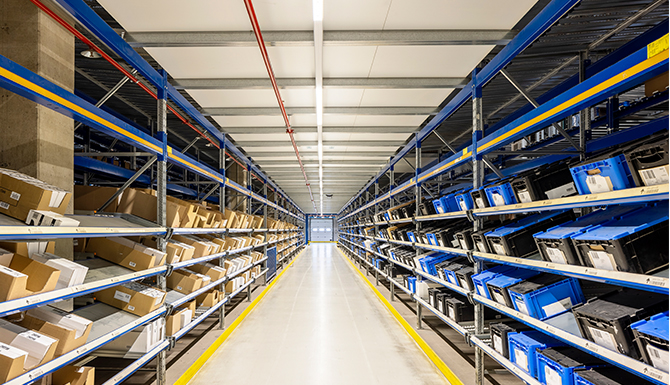 Project Rights for the Second Airport Logistics Complex
Project Rights for the Second Airport Logistics Complex- New Growth Cargo Rights
- GDC (Global Distribution Center) Rights
- Social Value Rights
- Telephone : +082-32-741-2277
- Email : cargo@biz.airport.kr
- Managing department : Cargo Marketing Team

